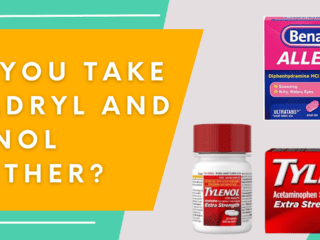As is the case with any other medication, there may be some instances where propranolol interactions can occur. In such cases, use is not recommended, or usage will have to be adjusted in order to prevent or reduce the risk of negative interactions occurring from other drugs, medical conditions, or even food and drink.
Drug Interactions
According to the FDA, drugs that may interact with this medication include the following.
- Inducers and inhibitors of cytochrome P-450 enzyme 1A2
- Antiarrhythmics
- Calcium channel blockers
- Migraine medications such as zolmitriptan
- Theophylline
- Benzodiazepines
- Neuroleptic drugs such as thioridazine or chlorpromazine
- Anti-ulcer drugs such as cimetidine
- Lipid-lowering drugs like cholestyramine or colestipol
- Warfarin
- Alcohol
Please note that this list may not be complete, and other interactions with drugs not listed here may occur.
NSAIDs (Non-steroidal Anti-inflammatory Drugs)
NSAIDs reduce pain and fever and work by inhibiting certain isoenzymes. Examples of NSAIDs include ibuprofen, or, the brand-name medicine, Advil.
Taking an NSAID with propranolol may interfere with some of the actions of the propranolol, such as lowering blood pressure. Anyone prescribed propranolol should tell their doctor if they frequently take ibuprofen or Advil.
Benadryl (Diphenhydramine)
Diphenhydramine is an antihistamine sold under many brand names, including Benadryl. It is also an ingredient in nighttime pain relievers such as Tylenol PM or Advil PM because this drug causes drowsiness.
Taking any over-the-counter medication with diphenhydramine while on propranolol may have additive effects because the two drugs have similar side effects. There may be a drop in blood pressure, for example. Some people experience headaches when taking both medications. Other common complications of taking both drugs include lightheadedness, fainting, and changes in heart rate.
Methadone (Diskets)
Methadone, typically sold under the brand names Dolophine or Methadose, is an opioid drug used as part of opioid maintenance therapy. Someone who has an opioid use disorder might take methadone as a replacement to avoid severe withdrawal. Although methadone is also addictive, detoxing from it tends to be easier.
Propranolol is a potential aid during detoxification. One study found that patients taking propranolol during the detox process were more likely to complete the program.
Adderall
Adderall is a stimulant drug capable of increasing blood pressure. Propranolol is a beta-blocker used to control blood pressure. In other words, the two drugs tend to work against each other. Taking them in combination is something one would only do with the approval of a physician.
THC (Tetrahydrocannabinol)
THC is the active ingredient in marijuana. It may also be an active ingredient in cannabis edibles and other products on the market in states where marijuana is legal. Combining it with propranolol may interfere with its ability to lower blood pressure. People who use marijuana products regularly should alert their doctors before taking propranolol.
Epinephrine (EpiPen)
Epinephrine given through an EpiPen opens up the bronchial tubes in an emergency, such as a major allergic reaction. Your doctor might prescribe something other than propranolol if you carry an EpiPen. Propranolol can decrease the effectiveness of epinephrine and may interfere with opening the bronchial tubes in an emergency.
Albuterol / Salbutamol (ProAir HFA)
Albuterol/salbutamol opens up the bronchial tubes for those with a chronic respiratory condition such as COPD or asthma. Taking propranolol may decrease the ability of albuterol/salbutamol to open those tubes and improve breathing.
Food Interactions
Sometimes the foods we eat and the beverages we drink can also interact with our medications. Food and drink that may interact with this drug include:
- Caffeine, especially in beverages such as coffee, tea, or soda
Please note that this list may not be complete, and there may be other foods and beverages that interact with this drug.
Propranolol and Alcohol
For more information, please visit our page on propranolol and alcohol interactions.
Vitamins & Supplements
One should also discuss taking vitamin supplements with a doctor before beginning treatment with propranolol. Dietary supplements can sometimes affect the absorption of medications.
When approved by your doctor, it is a good idea to take vitamin supplements at least two hours before or after taking a dose of propranolol. Taking them together might decrease the effectiveness of propranolol.
Disease & Conditions Interactions
Sometimes certain medications can increase the risk of negative side effects for patients with certain diseases or other medical conditions. According to the FDA, diseases, and medical conditions that are known to negatively interact with propranolol include:
- Cardiogenic shock
- Sinus bradycardia and greater than first-degree block
- Bronchial asthma
- History of heart failure
- Nonallergic bronchospasms such as chronic bronchitis or emphysema
- After major surgery
- Diabetes
Please note that this list may not be complete, and there may be other diseases and medical conditions where patients should not take this medication.
Propranolol and Pregnancy
For more information, please visit our page on propranolol and pregnancy risks.
Propranolol and Breastfeeding
For more information, please visit our page on propranolol and breastfeeding risks.
Weight Gain
Beta-blockers like propranolol can cause weight gain in the first few months of treatment.
Disclaimer: this article does not constitute or replace medical advice. If you have an emergency or a serious medical question, please contact a medical professional or call 911 immediately. To see our full medical disclaimer, visit our Terms of Use page.





